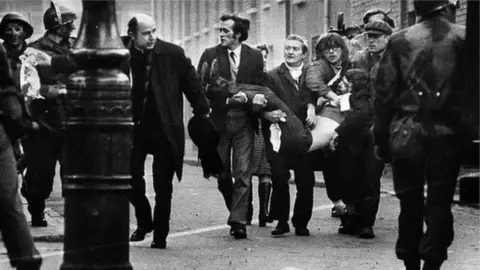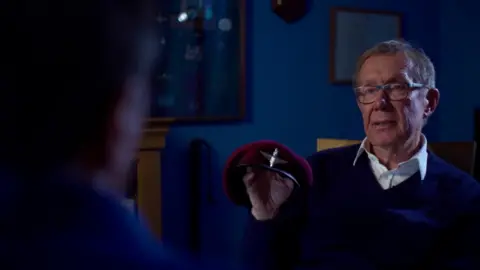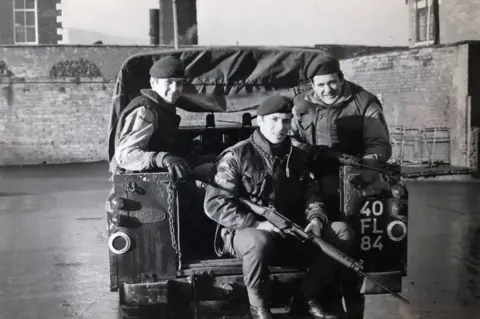Bloody Sunday: Tense wait for soldier prosecution decision
I was in Londonderry as a young journalist on the day that became known as "Bloody Sunday" in 1972, when soldiers of the Parachute Regiment shot dead 13 innocent civilians on a civil rights march against internment without trial.
The families whose loved ones were killed or wounded have waited 47 years to see if there would be prosecutions. Now their wait is almost over.
The decision will be announced next week. Only a handful of officials in the Northern Ireland Public Prosecution Service (PPS) know what that decision will be.
The PPS insists there have been - and will be - no leaks.
Lord Saville's official inquiry into the killings, that took 12 years and cost more than £200m, concluded that all victims were innocent and posed no threat.
The paratroopers, he said, lost their self-control and fired without discipline.
His unequivocal conclusion led the then prime minister, David Cameron, to deliver a historic apology in the House of Commons and to the people of Derry.
'Murder is murder'
But to many of the grieving families, the apology, though welcomed, did not represent closure.
They fought on, believing that closure would only come when the soldiers responsible for the killings faced prosecution and the consequences.
John Kelly, whose brother Michael was shot dead at a barricade in Rossville Street, told me: "Murder is murder, no matter how long ago it is. Justice has to be seen to be done."
Although he probably reflects the feelings of most nationalists in Derry and beyond, it is not a universal reaction.

Remarkably the wife and daughter of Gerry McKinney, who was killed by a single bullet - according to his widow Ida, "with his hands in the air" - do not seek retribution.
I first interviewed Ida, now 80, more than 25 years ago. She described putting her fingers through the bullet holes in Gerry's coat, jacket and shirt.
"I've forgiven them all now," she told me. "It took me a while. It's not in me to have hatred."
Her daughter Regina agrees: "I refuse to let it dictate my life. I don't want to live with revenge. I don't want to live with hatred."
Thirteen people died and 15 were injured on the day after soldiers opened fire.
'Job well done'
All those years ago, I also interviewed a soldier known as Sergeant O who expressed not a scintilla of regret or remorse for what he and his comrades did.
"We were under fire. We started looking for targets and started dropping them. Shooting them. The mood between the blokes was not elation but a job well done."
I expressed incredulity. A job well done - with 13 dead? "Yes, if somebody's firing at you and you fire back and you kill him, you've stopped him killing you. Is that not a job well done?"
Bloody Sunday has hung over Sergeant O as it has hung over victims' families, although for different reasons and with different emotions.

Meeting him again as the decision on prosecutions grew ever nearer, he remained consistent with what he had told me before - with one exception.
Given that Lord Saville reported several years after I conducted the initial interview, did he now accept his finding that all the 13 dead were innocent?
"Obviously my view has altered because some innocent people were killed, I think that's beyond a doubt."
I pointed out that Lord Saville had said that all the victims were innocent.
"I don't care what Lord Saville said," he challenged. "He wasn't there."
I asked if in the light of the inquiry's findings, it was still his view that it was a job well done.
"Yes," he said.
Does he feel any guilt at what happened?
"No," he replied and said he would do exactly the same again.
'Part of a war'
Gen Sir David Richards, a Northern Ireland veteran who rose to become the head of the UK's armed forces as chief of the defence staff, understands the pressures the paratroopers were under.

"Bloody Sunday was part of a war. These are warriors, soldiers who are going into a situation uncertain of what may happen next.
"You might have a split second to take a decision to protect yourself and your comrades in arms."
Does he believe soldiers should be prosecuted?
"My instinct is that they shouldn't. [It's] time to put it behind us and move on for the sake of all communities and move on like they've done so successfully in countries like South Africa."
But moving on is not an option at this stage.
Whatever the decision next week, the law will take its course.
